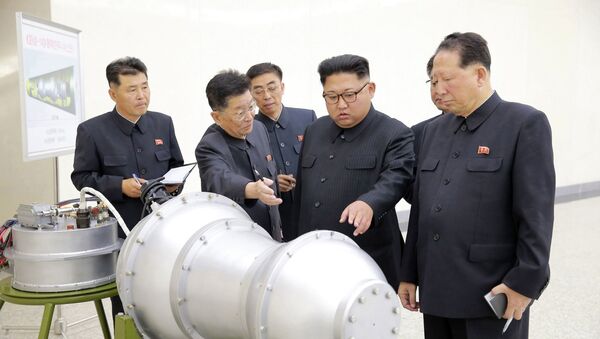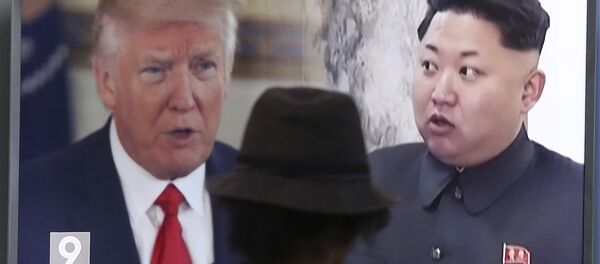WASHINGTON (Sputnik) — Trump issued an executive order Thursday that bolsters the US Treasury Department's ability to monitor individuals who provide materials, services or technology to North Korea. The punishing sanctions target North Korea’s textiles, fishing and manufacturing industries.
On September 19 in a speech before the UN General Assembly, Trump claimed that, while the United States had great strength and patience, if forced to defend itself or its allies, the nation would have no choice but to "totally destroy" North Korea.
NUCLEAR ACCLERATION
Kim Jong Un will use Trump's provocative claims as a catalyst for accelerating the development of an Intercontinental Ballistic Missile (ICBM) capable of carrying a nuclear warhead that can reach the United States, experts told Sputnik.
"This will make Kim more convinced that a nuke is the only way to secure their national security," the director of the Walter H. Shorenstein Asia-Pacific Research Center at Stanford University, Dr. Gi-Wook Shin said on Friday.
Accordingly, he added, North Korea will continue with its nuclear and missile development and once they achieve what they want and or need, nuke capability with an ICBM, they will ask the United States to negotiate.
"The US and South Korea will then have to make another tough decision, whether to negotiate with nuclear North Korea or continue to press with sanctions," the professor said.
North Korea bolted from the Treaty on the Non-Proliferation of Nuclear Weapons (NPT) in 2003 and claimed it conducted its first underground nuclear test in Oct. 2006.
NORTH KOREA STRATEGY
The greatest threat to Kim Jong Un's control over North Korea would be to bow down to US and international pressure to relinquish its nuclear program. Its core national policy is to never capitulate to any outside power whether it’s the United States or China, a Canadian regional expert posited.
"The political equilibrium inside North Korea is dependent on not capitulating to any foreign power, whether that be the USA or China," University of Toronto's Dept. of East Asian Studies chair Andre Schmid told Sputnik. "To capitulate would arguably be the single largest risk to Kim Jung Un’s personal power."
"Nobody knows what will happen after a nuke capable ICBM including possibly within North Korea, Schmid added. "It’s that very uncertainty that underlies the escalating tension."
Technically, the United States and North Korea are still in a state of war. On July 27, 1953 the two nations signed an armistice to cease hostilities until a peaceful solution could be found.
On Friday, Russian Foreign Minister Sergey Lavrov called on US and North Korean "hot heads" to scale down the rhetoric because unleashing war on the Korean peninsula was unacceptable.



